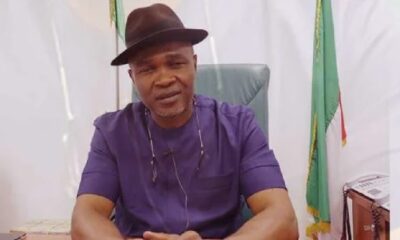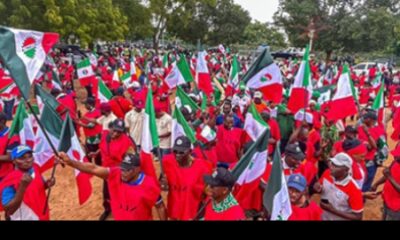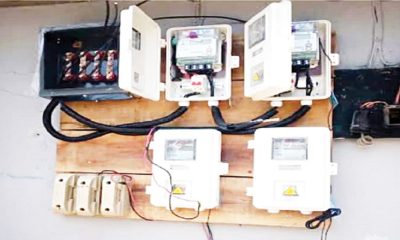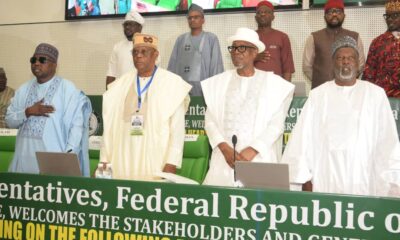News
FG Moves To Disconnect 50 Million Unlinked SIMs Next Month

While the insecurity situation in some parts of the country has festered in the last seven years and has led to increased banditry, terrorism and frauds across boards, the Federal Government will from September 15, 2024 block all Subscriber Identification Modules (SIMs) not linked to National Identity Numbers, NIN.
The FG made this announcement through the Nigerian Communications Commission (NCC) yesterday in a statement, where it informed that it has pegged the final deadline date for the linkage of SIMs to NINs to September 14.
This final deadline date is coming amid a rise in the activities of criminals, who still use SIMs, and NINs to perpetrate their criminal activities. The SIM-NIN linkage exercise ab initio, according to the government was to help in addressing criminality, including kidnappers, bandits, and fraudsters, among others. But the extent of success cannot be ascertained.
Indeed, NCC in the statement signed by the Director of Public Affairs, Reuben Mouka, to announce the deadline, said Nigeria has made significant progress in the Federal Government’s 2020 policy to link all SIMs to NINs.
The telecoms regulator disclosed that to date, over 153 million SIMs have been successfully linked to a NIN, reflecting an impressive compliance rate of 96 per cent, a substantial increase from 69.7 per cent in January 2024.
Though the NCC claimed that there has been 96 per cent complaint for the linkage, The Guardian checks showed that over 50 million SIMs may be blocked by September if not linked, especially because of the multi-SIMMING nature of Nigerians and use of different devices that are SIM dependent.
As of Q1, 2024, the NCC puts active mobile subscriptions in the country at 219 million and in the statement of yesterday, about 153 million SIMs have been linked, meaning that some 50 million risk disconnection by mid-September. It must also be stated that between the second quarter and now, some lines must have been registered and linked, which would make the exposed SIMs hover between 50 million and 55 million.
It should be noted that under the NIN-SIM linkage policy, an individual is allowed to register a maximum of four SIM cards per network operator. This is exclusive of SIMS that the individual may wish to use in Internet of Things (IoT) devices such as wearable, trackers, among others.
NCC said as the country approaches the final phase of this critical process, it seeks the continued cooperation of all Nigerians to achieve 100 per cent compliance.
The telecoms regulator said the complete linkage of all SIM cards to NINs is essential for enhancing the trust and security of the digital economy.
“By verifying all mobile users, this policy strengthens confidence in digital transactions, reduces the risk of fraud and cybercrime, and supports greater participation in e-commerce, digital banking, and mobile money services. This, in turn, promotes financial inclusion and drives economic growth,” it stated.
NCC revealed that through collaboration with the Office of the National Security Adviser (ONSA) and the National Identity Management Commission (NIMC), it uncovered alarming cases where individuals possessed an unusually high number of SIM cards—some exceeding 100,000.
The Commission said it remained committed to working with se
NewsFG Moves To Disconnect 50 Million Unlinked SIMs Next Month
ByVreportersPublished on August 29, 2024
While the insecurity situation in some parts 3the country has festered in the last seven years and has led to increased banditry, terrorism and frauds across boards, the Federal Government will from September 15, 2024 block all Subscriber Identification Modules (SIMs) not linked to National Identity Numbers, NIN.
The FG made this announcement through the Nigerian Communications Commission (NCC) yesterday in a statement, where it informed that it has pegged the final deadline date for the linkage of SIMs to NINs to September 14.
This final deadline date is coming amid a rise in the activities of criminals, who still use SIMs, and NINs to perpetrate their criminal activities. The SIM-NIN linkage exercise ab initio, according to the government was to help in addressing criminality, including kidnappers, bandits, and fraudsters, among others. But the extent of success cannot be ascertained.
Indeed, NCC in the statement signed by the Director of Public Affairs, Reuben Mouka, to announce the deadline, said Nigeria has made significant progress in the Federal Government’s 2020 policy to link all SIMs to NINs.
The telecoms regulator disclosed that to date, over 153 million SIMs have been successfully linked to a NIN, reflecting an impressive compliance rate of 96 per cent, a substantial increase from 69.7 per cent in January 2024.
Though the NCC claimed that there has been 96 per cent complaint for the linkage, The Guardian checks showed that over 50 million SIMs may be blocked by September if not linked, especially because of the multi-SIMMING nature of Nigerians and use of different devices that are SIM dependent.
As of Q1, 2024, the NCC puts active mobile subscriptions in the country at 219 million and in the statement of yesterday, about 153 million SIMs have been linked, meaning that some 50 million risk disconnection by mid-September. It must also be stated that between the second quarter and now, some lines must have been registered and linked, which would make the exposed SIMs hover between 50 million and 55 million.
It should be noted that under the NIN-SIM linkage policy, an individual is allowed to register a maximum of four SIM cards per network operator. This is exclusive of SIMS that the individual may wish to use in Internet of Things (IoT) devices such as wearable, trackers, among others.
NCC said as the country approaches the final phase of this critical process, it seeks the continued cooperation of all Nigerians to achieve 100 per cent compliance.
The telecoms regulator said the complete linkage of all SIM cards to NINs is essential for enhancing the trust and security of the digital economy.
“By verifying all mobile users, this policy strengthens confidence in digital transactions, reduces the risk of fraud and cybercrime, and supports greater participation in e-commerce, digital banking, and mobile money services. This, in turn, promotes financial inclusion and drives economic growth,” it stated.
NCC revealed that through collaboration with the Office of the National Security Adviser (ONSA) and the National Identity Management Commission (NIMC), it uncovered alarming cases where individuals possessed an unusually high number of SIM cards—some exceeding 100,000.
The Commission said it remained committed to working with security agencies and other stakeholders to crack down on the sale of pre-registered SIMs, thereby safeguarding national security and ensuring the integrity of mobile numbers in Nigeria.
“To ensure full compliance with the NIN-SIM linkage policy, the NCC has directed all Mobile Network Operators (MNOs) to complete the mandatory verification and linkage of SIMs to NINs by September 14, 2024.
“Effective September 15, 2024, the Commission expects that no SIM operating in Nigeria will be without a valid NIN,” it stated. NCC urged all members of the public, who have not yet completed their NIN-SIM linkage, or who have faced issues due to verification mismatches, to visit their service providers promptly to update their details before the deadline. Alternatively, the approved self-service portals are available for this purpose.
The Commission also reminded the public that the sale and purchase of pre-registered SIMs are criminal offences punishable by imprisonment and fines.
“We encourage citizens to report any such activities to the Commission via our toll-free line (622) or through our social media platforms,” it stated.
Indeed, the acclaimed success of the NIN-SIM linkage has been questioned as regards the extent to which the initiative has helped the country to curb the rising menace of kidnapping, banditry, cyber fraud and the rest in the country.
It is worrisome that despite the sacrifices made by Nigerians to get their SIM registered and linked to NIN, crime levels refused to abate in the country.
At the commencement of the linkage exercise in 2020, the then Minister of Communications and Digital Economy, Prof. Isah Pantami, claimed that the process would enable Nigeria to tackle the growing insecurity in the country, but four years after, insecurity has festered.
Bandits have become more emboldened, kidnapping harmless Nigerians at every slightest opportunity, subsequently smiling to banks after every successful operation without traces, despite the NIN-SIM initiatives.
According to checks, from January and July 2024, no fewer than 2,140 people were kidnapped. An SBM Intelligence report on Nigeria’s security crisis reveals alarming statistics for 2024, showing, 3,277 people kidnapped in 135 mass abduction incidents, resulting in 125 deaths. The North West and North Central regions were hardest hit, with 2,719 kidnappings combined.
It also showed that families of 62 victims, representing 2.89 per cent of the total abductees, paid the sum of N389 million as ransom to secure their release from the kidnappers.
Over the seven months, gunmen reportedly kidnapped 193 people in January, 101 in February, 543 in March, 112 in April, 977 in May, 97 in June, and 117 in July, totaling 2,140.
Guardian
News
Chelsea, Brentford shares the spoil in premier league’s goalless draw

Chelsea’s frustrations on the road continued on Sunday as they played out a drab 0-0 draw against Brentford in the Premier League. The fourth-placed Blues, desperate to solidify their position in the race for Champions League qualification, delivered another uninspiring display under manager Enzo Maresca. Much of the attention was focused on the decision to bench England forward Cole Palmer for almost an hour, sparking questions about the Italian boss’s priorities ahead of a crucial UEFA Conference League quarter-final clash with Legia Warsaw on Thursday. When Palmer was finally introduced, his impact was muted, with his only significant contribution being a missed chance over the crossbar.
Chelsea have a UEFA Conference League quarter-final trip to Legia Warsaw on Thursday, but Maresca’s priorities were questioned following the Blues’ insipid display.
The match itself offered little excitement, highlighting the struggles of both sides. Brentford, battling their own challenges of form at home, seemed unable to capitalize on Chelsea’s sluggish performance. Despite the Blues’ attempts to gain control, Maresca’s cautious tactical approach failed to generate clear-cut opportunities for his team. With Chelsea winless away from home in the league since December, the encounter at the Brentford Community Stadium was emblematic of their recurring troubles on the road. Fans and analysts alike questioned whether Maresca’s approach was adequate for a team still fighting for Champions League qualification amid an increasingly competitive field.
The spotlight on Cole Palmer’s absence from the starting lineup was another defining feature of the match. The England forward, widely regarded as a key player for Chelsea this season, could have provided the creativity and attacking edge the Blues sorely lacked throughout the game. Maresca’s decision to hold Palmer back drew criticism, especially given the urgency of securing vital points for Chelsea’s league ambitions. When Palmer did make his long-awaited entrance, the young star struggled to find his rhythm, leaving fans disappointed and underscoring the broader issues in Chelsea’s attacking play.
With Manchester City breathing down Chelsea’s neck in the Premier League standings, the stakes for Sunday’s result were high. The goalless draw opened the door for fifth-placed City to overtake Chelsea should they secure a win against Manchester United in the day’s late fixture. For the Blues, the outcome not only added pressure to their domestic campaign but also cast a shadow over their upcoming Europa Conference League clash. Maresca now faces the dual challenge of rejuvenating Chelsea’s confidence in Europe while addressing their league form, which could ultimately determine their fate in the pursuit of Champions League football next season.
Top copy trading platform
Discover the best copy trading platform. Copy expert traders’ strategies on Deriv cTrader.
Deriv.com
by TaboolaSponsored Links
The result also extended Brentford’s struggles at home, as they continued their winless streak in front of their fans. Both teams leave the match with unanswered questions about their form, tactics, and aspirations as the Premier League season enters a critical phase. For Chelsea, the disappointment underscores the need for decisive action from Maresca and his squad as they prepare for crucial fixtures on both domestic and continental fronts. Brentford, meanwhile, will aim to regroup and find ways to regain momentum in their remaining matches. The uneventful encounter serves as a reminder of the challenges faced by teams vying to navigate the pressure of top-flight football.
News
“How we imortalised Olunloyo before his death-Makinde

By Kayode Sanni-Arewa
Governor of Oyo State, Seyi Makinde has said he is happy that former governor of the State, Omololu Olunloyo was imortalised before his demise.
Makinde, in a condolence message by his media aide Sulaimon Olanrewaju on Sunday, said the country had lost a patriotic leader, an icon and one of its most cerebral former administrators with the politician’s demise.
The governor said it is sad that the late mathematical guru and administrator passed away before his 90th birthday.
“This death hits differently because I was looking forward to Baba’s 90th birthday, which would have come up on April 14. However, we have to submit to the will of God, who gives and takes lives as He wills.
“My joy is that our government immortalised and honoured Pa Olunloyo in his lifetime and he was present to witness it as we named the Ibadan Airport Road and the Leisure Park on the axis after him in recognition of his service to the state.
“May the Lord grant repose to his soul and give his family the fortitude to bear his demise,” Mr Makinde said.
The death of Mr Olunloyo was confirmed on Sunday morning through a statement by his family.
The deceased died just a few days before his 90th birthday, according to the statement.
News
Iran turns down Trump’s call for direct nuclear talks

Iran’s top diplomat has rejected direct negotiations with the United States as pointless, his office said Sunday, after US President Donald Trump said he preferred face-to-face talks over its nuclear programme.
Trump sent a letter to Iran’s supreme leader Ayatollah Ali Khamenei last month calling for negotiations but warning of military action if diplomacy failed.
On Thursday, the US president said he favoured “direct talks”, arguing they were “faster” and offered a better understanding than going through intermediaries.
But Iranian Foreign Minister Abbas Araghchi said direct talks made no sense with a country “that constantly threatens to resort to force in violation of the UN Charter and that expresses contradictory positions from its various officials”.
“We remain committed to diplomacy and are ready to try the path of indirect negotiations,” he was quoted as saying in a statement issued by his ministry.
Iran keeps itself prepared for all possible or probable events, and just as it is serious in diplomacy and negotiations, it will also be decisive and serious in defending its national interests and sovereignty.”
On Saturday, Iranian President Masoud Pezeshkian said his country was willing to engage in dialogue with the United States on an “equal footing”.
He also questioned Washington’s sincerity in calling for negotiations, saying “if you want negotiations, then what is the point of threatening?”
Iran and the United States have had no diplomatic relations since shortly after the 1979 Islamic Revolution with some regional countries like Oman playing a mediating role between the two sides.
Letter diplomacy
Trump’s letter was delivered to Iran via the United Arab Emirates, and Tehran responded at the end of March via the Sultanate of Oman.
On Sunday, the chief of staff of the Iranian armed forces, General Mohammad Bagheri, said Iran’s response stressed that “we seek peace in the region”.
“We are not the ones who start wars, but we will respond to any threat with all our might,” he said of the content of Iran’s response.
Western countries, led by the United States, have for decades accused Tehran of seeking to acquire nuclear weapons.
Iran rejects the allegation and maintains that its nuclear activities exist solely for civilian purposes.
In 2015, Iran reached a landmark deal with the permanent members of the UN Security Council, namely the United States, France, China, Russia, and the United Kingdom, as well as Germany, to limit its nuclear activities.
The 2015 agreement — known as the Joint Comprehensive Plan of Action — gave Iran sanctions relief in exchange for curbs on its nuclear programme to guarantee that Tehran could not develop a nuclear weapon.
In 2018, during Trump’s first term in office, the United States withdrew from the agreement and reinstated biting sanctions on Iran.
A year later, Iran began rolling back on its commitments under the agreement and accelerated its nuclear programme.
On Monday, Ali Larijani, a close adviser to Khamenei, warned that while Iran was not seeking nuclear weapons, it would “have no choice but to do so” in the event of an attack against it.
-
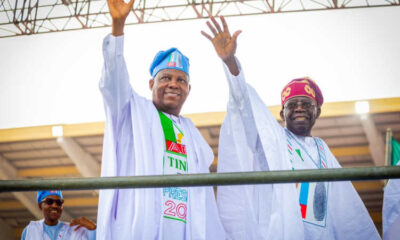
 Politics11 hours ago
Politics11 hours agoTinubu Gives Fani Kayode, Others New Appointments (See Full List)
-

 News11 hours ago
News11 hours agoDANGER! Ex-Soldier Abubakar Affan Vows to Kill VeryDarkMan ‘Like Deborah Samuel’
-

 News14 hours ago
News14 hours agoWhy NYSC maybe extended by FG- Minister
-

 News14 hours ago
News14 hours agoIbas moves to rehabilitate damaged Rivers LG secretariats
-
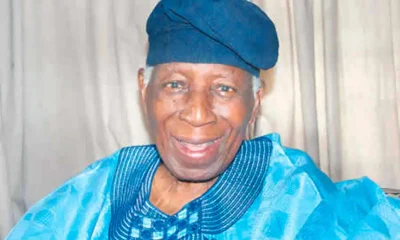
 News11 hours ago
News11 hours agoJust in: Ex-Oyo governor, Olunloyo is dead
-

 News14 hours ago
News14 hours agoWike commissions another solar-powered market in Abuja
-

 Economy13 hours ago
Economy13 hours agoCrude prices slump to $65 first time since 2021
-

 Economy14 hours ago
Economy14 hours agoCBN allocates $197.71m into FX market to support naira




